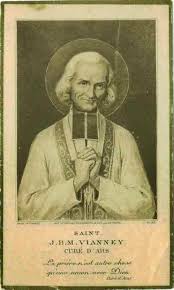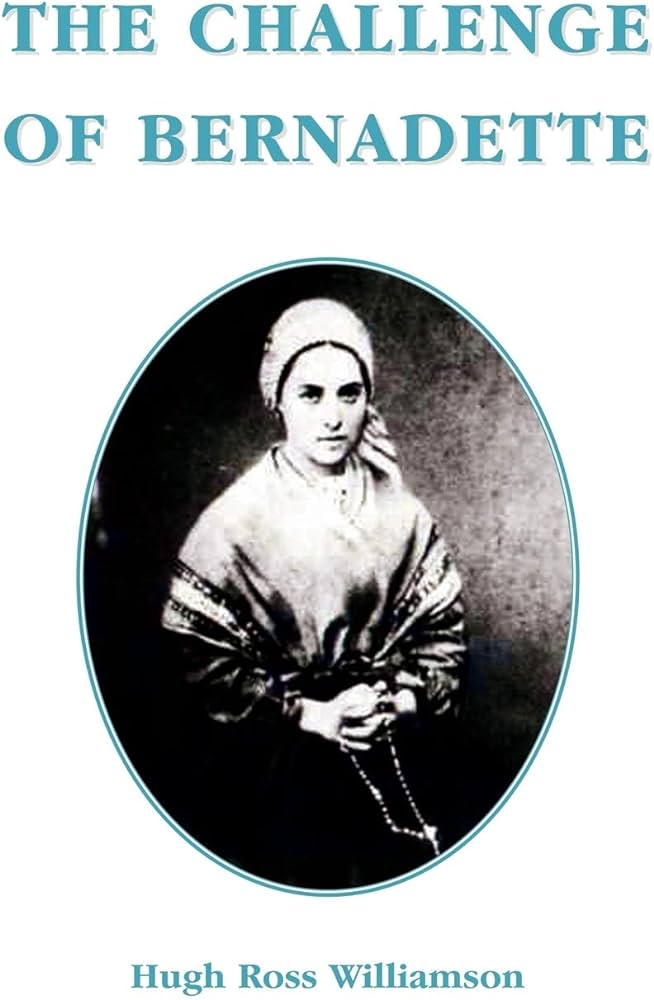
Today, in the Traditional calendar, is the Feast day of St. John-Marie Baptiste Vianney, commonly known as the Curé of Ars.
St. John Vianney is the remarkable French saint, who, during the Nineteenth Century, transformed his small parish from a hive of indecency and lack of religiosity, to one of strong faith, piety and good-will.
This transformation was due entirely to the ceaseless effort and holy works of this tireless saint. And people flocked from far and wide, to witness the holiness of this humble priest.
St. John-Marie Vianney possessed an incredible gift of vision, enabling him to see the inner workings of the souls who came to him for confession and counsel. He saw how salvation occurred at a personal level, in terms of the work each soul was required to undertake, for their own individual salvation.
He understood therefore, the necessity of suffering and of penance and good works, needed to purify the soul, in order to gain its’ place in the heavenly kingdom.
These special gifts meant that he was regarded saintly long before his death. As a result, thousands upon thousands of pilgrims visited the town of Ars, to find consolation, cure but most of all, to confess with this holy priest.
St. John Vianney came from very humble stock. Born in 1786, in rural France, his early years were much effected by the anti-religious ferocity of the French Revolution.
John-Marie spent the first years of his life herding the family cattle and sheep, with his sister. Whilst herding, they were also required to knit woollen stockings. But the young boy was so naturally drawn to prayer that he persuaded his sister to undertake his work too, whilst he prayed and catechised other children.
Being from a pious family, he spent time secretly preparing, with a group of sisters in hiding, for his First Communion. His first confession was also with a priest in hiding. His parents themselves risked their lives, protecting many a religious or priest.
In fact, due to the lack of religious freedom, John-Marie became the catechist for the children in his area.
This natural propensity for prayer and pious acts fuelled a longing in the young boy to study for the priesthood.
His father objected, for the family was poor and he required his son to work and bring in money.
But John’s longing persisted and some years later, at nineteen years of age, he attended school.
He struggled and struggled to learn, finding it almost impossible. The Latin was particularly difficult, yet was, of course, required for the formation of a priest.
After many years of struggle, his superiors, recognising his sincerity and his aptitude for prayer and catechising, relented. He was ordained without the usual levels of academic competence achieved.
Yet, what a priest he became!
He was sent to Ars, for his superiors saw how he would bring piety and religious fervour into this small town, which greatly lacked faith and love of God.

St. John Vianney began his ministry in Ars, by undertaking severe acts of mortification and penance, to appease God for this lack of religiosity within the town. It was not unknown for him to be subject to attacks from the devil and these were sometimes extreme and frequent.
He was heard to say that when the severity of these diabolical attacks intensified, he knew that he was about to win a great sinner for God. He called these souls ‘big fish’.
And win souls he did, most ardently. Not only in the town of Ars, which became a wonderful example of piety and fervent faithfulness. Those who came from far and wide, usually for confession, were also won back to the good God.
In a long and detailed biography of St. John-Marie Vianney, entitled The Curé d’Ars (reviewed here at this site) by the Abbé François Trochu, we find moving passages written about the transformation of Ars. Of the saint’s good works, Abbé Trochu wrote:
Not over night, but little by little, the tiny hamlet underwent a change. The people of Ars were unable to remain aloof for long from the grace which radiated from the remarkable personality of their priest. When a man attacks inveterate disorders and popular vices, he challenges opposition.
St. John was not unprepared – he knew the enemy would raise his head. “If a priest is determined not to lose his soul,” he exclaimed, “so soon as any disorder arises in the parish, he must trample underfoot all human considerations as well as the fear of the contempt and hatred of his people.
It took St. John Vianney ten whole years to renew Ars, but the community changed so noticeably and to such an extent that it was observed even by outsiders. There was no more working on Sundays, the church was filled more and more every year, and drunkenness fell off.’
And just as he had done when he was young, he delighted in teaching the children their catechism and he did this daily. After a while the grown-ups came too and he found that those who were children during the Revolution were in complete ignorance of their religious duties. He taught the people love for the rosary and wanted everyone to carry one around at all times.’
And of the Curé’s special gift of vision, we read:
The priest of Ars possessed the ability to see the human soul in its nakedness, freed of its body. This grace is only rarely bestowed on men. He never put his nose into the spiritual affairs of other people. He was entirely free from inquisitiveness. Like St. Francis de Sales, he had the gift of “seeing everything and not looking at anyone.”
In confessing people this holy man, who had a fundamental knowledge of sin, strove after one thing only – to save souls. This was his ardent desire, and for the sake of it he suffered all the tortures of his daylong confinement in the confessional.
This great saint heard confessions from 13 to 17 hours a day, and could tell a penitent’s sins even when they were withheld. In order to save souls one must be possessed of that holy love of men which consumed the priest of Ars.
“The great miracle of the Curé d’Ars,” someone has said, “was his confessional, besieged day and night.”
It was of course, this gift which fuelled the saint’s fervour for saving souls. And again, in the same book, we also find many testimonials from those who visited the Curé and procured healings and wise counsel. Here are some examples – first of all:
In 1854, a girl of Montchanin (Saone-et-Loire) of the name of Farnier, came to Ars to beg from M. Vianney the cure of her paralyzed leg.
“My child,” the saint told her, “you disobey your mother far too often, and answer her back in a disrespectful manner. If you wish the good God to cure you, you must correct that ugly defect. Oh! what a task lies before you! But remember one thing: you will indeed get well, but by degrees, according as you try to correct that defect.”
As soon as Mlle. Farnier returned home she endeavored to show more obedience and respect to her mother. Her crippled leg, which had been four inches shorter than the other, insensibly grew longer, and at the end of a few years her infirmity had wholly vanished.
And then:
His cousin, Marguerite Humbert, came one day to beg his prayers for one of her little daughters who was dangerously ill. “She is ripe for heaven,” he said without hesitation. “As for you, my cousin, you need crosses to make you think of God.”
And here is a moving account, where the Curé witnesses a chosen soul, who would do best to undertake her purgatory on earth:
Françoise Lebeau, a poor girl of Saint-Martin-de-Commune in the Saoneet-Loire, had become quite blind. She went with her mother on a pilgrimage to Ars. They begged their bread the whole way and slept in stables or sheds.
To this poor girl M. Vianney did not fear to disclose something of the divine mystery of suffering, for his inspired gaze had fathomed her valiant spirit.
“My child,” he said, “you can be cured, but if the good God restores your sight, your salvation will be less assured; if, on the contrary, you consent to keep your infirmity, you will go to heaven, and I even guarantee that you will have a high place there.”
The blind girl understood; she no longer asked for a cure and left Ars in a state of perfect resignation to God’s will.
We cannot finish here, without mentioning the depth of St. John Vianney’s love of God. His whole life is a testimony to this love. The outward signs are too numerous to count. From the moment, as a child, he began passionately teaching others of the good God, to his tireless and ceaseless works for procuring graces from heaven upon his parish and each person he encountered, we witness his immense love of God.
Yet, there is another way in which this holy priest expressed his love of God. And that is through the gift of tears.
St. John-Marie Baptiste Vianney was so surrendered to the will and love of the Lord that anything he saw, which wounded the Heart of the Saviour, reduced him to tears.
And so I will leave you with some beautiful passages from the Abbé Trochu on this special gift of tears. These are the Abbe’s words:
Other supernatural favors also – such as are met with in the lives of the greatest mystics – fell to the lot of the Curé d’Ars. Thus he received in a plentiful measure the gift of tears.
According to St. Teresa, these tears spring from a sentiment of ineffable tenderness towards God, or from the interior martyrdom endured by the soul when it sees God being offended.
M. Vianney could never speak of sin and sinners without shedding tears.
He sobbed all the time he was making the Stations of the Cross. When he distributed Holy Communion, tears would often trickle down upon his chasuble.
In the last years of his life in particular, he could never preach about the Eucharist, the goodness and love of God, the happiness of heaven – those were his favorite topics – without being stopped by his tears.
“Why do you weep so much, Father?” the Saint was asked by a sinner weeping by his side:
“Ah My friend, I weep because you do not weep enough.”
Let us pray today to St. John Vianney, Patron Saint of Priests, for the Priesthood and for Vocations. Let us also pray that we may share the gift of tears, in that we may become more sensitised to sin. And, let us pray that the healing and purifying sacrament of Confession may once again be frequented.
St. John Vianney, pray for priests.
St. John Vianney, pray for sinners.
St. John Vianney, pray for us.
Buying Books at Amazon Through These Links Gives Us a Commission. This Supports Our Apostolate. Thank You if You Can Help Us Like This!




